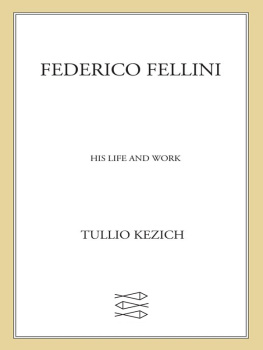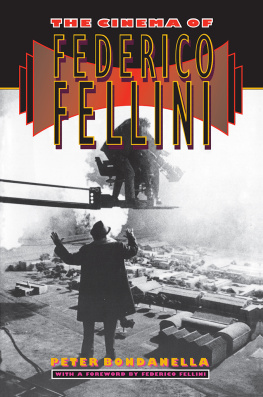Sam Rohdie - Fellini Lexicon
Here you can read online Sam Rohdie - Fellini Lexicon full text of the book (entire story) in english for free. Download pdf and epub, get meaning, cover and reviews about this ebook. year: 2019, publisher: Bloomsbury UK, genre: Non-fiction. Description of the work, (preface) as well as reviews are available. Best literature library LitArk.com created for fans of good reading and offers a wide selection of genres:
Romance novel
Science fiction
Adventure
Detective
Science
History
Home and family
Prose
Art
Politics
Computer
Non-fiction
Religion
Business
Children
Humor
Choose a favorite category and find really read worthwhile books. Enjoy immersion in the world of imagination, feel the emotions of the characters or learn something new for yourself, make an fascinating discovery.
- Book:Fellini Lexicon
- Author:
- Publisher:Bloomsbury UK
- Genre:
- Year:2019
- Rating:4 / 5
- Favourites:Add to favourites
- Your mark:
- 80
- 1
- 2
- 3
- 4
- 5
Fellini Lexicon: summary, description and annotation
We offer to read an annotation, description, summary or preface (depends on what the author of the book "Fellini Lexicon" wrote himself). If you haven't found the necessary information about the book — write in the comments, we will try to find it.
Fellini Lexicon — read online for free the complete book (whole text) full work
Below is the text of the book, divided by pages. System saving the place of the last page read, allows you to conveniently read the book "Fellini Lexicon" online for free, without having to search again every time where you left off. Put a bookmark, and you can go to the page where you finished reading at any time.
Font size:
Interval:
Bookmark:

FELLINI LEXICON

For Bill Routt
Contents
I want to especially thank Zygmunt Baranski, Bill Routt and my editor Rob White.
Des O'Rawe helped me enormously in substance and in spirit.
I am grateful for the help of Patricia McMurray, Geoffrey Nowell-Smith and Peter Stambler.
As ever there was Lam Shuk Foon with her love, patience, curiosity, charm, gaiety, wit, silliness, joy, smiles and a giggle in her eyes ... my Cabiria.
I decided to write this book as a lexicon, following a set of procedures. The procedures impose limits among which are brevity, precision, exactness.
The rules of the lexicon are:
there is no order of reading or writing save the alphabetical (the arbitrary);
entries are about function;
entries are brief;
there is no attempt at comprehensiveness.
I have made choices in accord with what I believe to be structurally pertinent to Fellini's films. The choices are also matters of chance, preference and association. An entry 'conmen' can lead to 'angels', or 'clowns', and also to 'trumpets'.
The lexicon is not scholarly nor scientific.
It is a play with meanings rather than their definition.
Fellini's films lend themselves to affiliation, overlap, superimposition.
I do not delimit what Fellini thinks, but try instead to specify how his films work. An idea, a theme, characters, settings in his films, belong to a web of intricate relations. It is the processes of the formation of those relations that interests me.
Each entry further weaves the web.
The entries in the lexicon are points of adhesion and also dispersion, condensing, then spinning out.
Unless otherwise indicated all quotes in French and Italian are from Fellini texts cited in the bibliography; translations are my own except where the original quote from Fellini is in English.
Strictly speaking, there are no angels in Fellini's films. No character represents an angel.
Some characters resemble angels or do angelic things.
Such likenesses appear casually as if by accident, as a matter of association. You discover an analogy, a mirroring, catching it.
The Fellinian angel is born of metaphor.
The peasants with faggots on their backs who pass Augusto in Il bidone as he lays dying beside the road are nothing out of the ordinary, nothing other than they are, peasants with faggots on their backs belonging to reality, to this world, yet the faggots look like wings and as a consequence the peasants, angels.

Otto e mezzo: 'Claudia'
The faggot on Gelsomina's back in La strada as she is called from the beach is a fact of reality. Yet, by a shift in view, it transports her to another world.
Her mother sells her to Zampan. At that moment Gelsomina finds another existence imagining being elsewhere. She will journey with Zampan into the world. The world to her is magic, make-believe, theatre, masquerade, spectacle, clowning. Gelsomina is overjoyed. She accomplishes the journey in her imagination and anticipation before it begins.
This imagination is angelic.
Picasso saw in two metal toy cars, placed bottom to bottom, the head of a baboon; in everyday nails, he saw the feet of a chicken; in bicycle handlebars, the horns of a bull; in scraps of wood and paper, a guitar.
There was nothing symbolic in these transformative sights.
The toy cars remain what they are (toy cars) to become what they are not (the head of a baboon) which they could be (in sculpture) if only you can see the likeness, the poetry in the banal, the fantastic in the quotidian.
Such strategies are not representational.
The toy cars do not represent the head of a baboon. They are the head of a baboon. And they are not.
There can be a make-believe without falsity, a make-believe with reality.
By such means the world is expanded.
Nothing changes yet every object, every moment is opened to an infinity of relations and possibilities by remaining what it is in order to be truly itself, and not. The universe becomes filled with unlikely paradigms.
As a result, vast distances can be traversed.
In La strada, 'Il matto' on the high wire, has wings attached to his back. To Gelsomina he seems an angel. When 'Il matto' descends the wire he notices Gelsomina. She seems to him to be an angel in the guise of a clown as he to her is a clown in the guise of an angel.
Her clown aspect (and his) are matters of resemblance, suggestions only. Resemblance makes them a couple. Angels, clowns, actors belong to otherworldliness, to the fantastic. You have to be a bit mad, certainly fanciful, to follow the lines of suggestion, perhaps you need to be an angel yourself.
Angels exist in Fellinian reality but they require our imagination to summon them into being.
Marcello in La dolce vita says to the young girl, Paola, in the restaurant by the beach: 'You look like an angel in an Umbrian church.'
In that instant she is an angel and remains herself.
The sadness of La dolce vita is that Marcello by the end of the film can neither recognise the young girl as herself nor as an angel in an Umbrian church.
He has lost sight.
The loss of sight is a loss of hope and thereby of invention, possibility, imagination, the loss of metaphor, the renunciation of the invisible. Joy has left the world for Marcello after having seen death and despair in the infanticide and suicide of Steiner where he also saw a part of himself and a part thereby of everyone.
Fausto and Moraldo in I vitelloni steal the statue of an angel from Fausto's employer, a seller of religious articles who has fired Fausto. Fausto and Moraldo wrap the statue in a cloth and put it on a handcart. Accompanied by the town's lunatic they bring the statue to a monastery where they try unsuccessfully to sell it. The friar, who refuses them, is perched on the branch of a tree (like an angel).
Fausto and Moraldo try to sell the statue at a convent to a nun, who is fragile and innocent, like Marcello's angel.
The friar and the nun are beings from another world while remaining in this one.
Dejected, the dishonest trio sprawl on vacant land, the statue of the angel beside them. Could they be the three Magi dressed as clowns? Or the Holy Trinity?
The lunatic is overtaken with joy. He sees an angel in the statue. The sight is not secular, not an angel represented, but spiritual, an angel present. An angel is there though nothing has changed, only a perspective.
This moment is like a miracle.
Reality is transformed without anything having happened.
The wife of the owner of the religious articles shop where Fausto works is plain, ordinary, dull. She is the provincial wife of a provincial shopkeeper. It is the eve of New Year. There is a celebration for the entire town. Fausto brings his new wife Sandrina to the celebration. The shopkeeper brings his wife. The wife enters the spectacle of the celebration and begins to glow, to scintillate like fireworks. She is happy, gay, smiling, laughing, fetching, flirtatious, animated, in short, another self.
She throws confetti in Fausto's face and giggles, her eyes shining.
He notices that she is beautiful, enchanting, and he desires her. She is an image he had seen every day. Today the image was different.
Font size:
Interval:
Bookmark:
Similar books «Fellini Lexicon»
Look at similar books to Fellini Lexicon. We have selected literature similar in name and meaning in the hope of providing readers with more options to find new, interesting, not yet read works.
Discussion, reviews of the book Fellini Lexicon and just readers' own opinions. Leave your comments, write what you think about the work, its meaning or the main characters. Specify what exactly you liked and what you didn't like, and why you think so.



